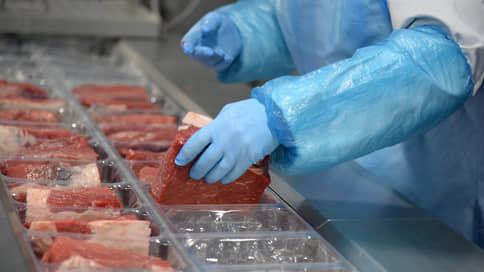It is necessary to calve – Newspaper Kommersant No. 176 (7377) of 09/23/2022
[ad_1]

The Ministry of Agriculture wants to extend the duty-free import of beef until 2023. According to Kommersant, the Ministry of Economy is already considering this proposal. This year, this measure was supposed to reduce domestic prices. But beef producers argue that it has only led to a reduction in the profitability of domestic production.
The Ministry of Agriculture proposed to the Ministry of Economy to extend the duty-free import of beef into the country in 2023 within a quota of 200 thousand tons, three sources told Kommersant in the market. Such a measure was introduced at the beginning of this year for 12 months and was supposed to curb the rise in prices for meat and meat products. The Ministry of Economy confirmed to Kommersant that the initiative had been received, adding that it was being considered by a specialized expert group. The Ministry of Agriculture did not provide a comment.
The proposal to extend the quotas is due to the fact that in Russia in the first half of the year it was not possible to increase beef production, Kristina Romanovskaya, general director of the Lazarevskoye Farm, knows. According to Rosstat, in eight months of 2022, volumes decreased by 3.3% year-on-year, to 866 thousand tons in slaughter weight. “Sudden removal of import quotas could provoke a deficit,” Ms. Romanovskaya explains.
The head of the National Meat Association (NMA), Sergei Yushin, does not exclude that by the end of this year, beef production may remain at the same level and even grow slightly. According to him, the slaughter season will begin in the near future, which accounts for up to 40% of the annual output. At the same time, duty-free importation is already negatively affecting the industry, says the general director of the National Union of Beef Producers Roman Kostyuk: “This provoked a decrease in prices for the purchase of livestock from farmers and the suspension of investment plans of companies.”
According to the NMA, from May to July, prices for live cattle fell from 222 to 169 rubles. per 1 kg for bulls, from 185 to 158 rubles. for 1 kg per heifer. Slaughterhouses and meat processing companies reduced the price of buying livestock from farmers and agricultural enterprises, since they could not recoup their costs otherwise, says Mr. Yushin. This, according to him, led to a reduction in the production of livestock for slaughter in the summer.
Kommersant’s source on the market indicates that the provision of benefits to meat importers did not lead to an increase in imports, which Russian producers were so afraid of. But Sergei Yushin points out that in January-February, beef supplies exceeded those in 2021 by 36%. Since March, due to logistical problems, a sharp jump in the dollar and difficulties with cross-border transfers, shipments have dropped sharply. In some months, for example, in June, 73% less beef was imported into the country than in the same month last year, the NMA adds.
Now there is a reverse trend, continues Mr. Yushin: due to the strengthening of the ruble and the solution of some of the problems with logistics, the profitability of duty-free imports of individual cuts of beef and raw materials from it exceeded 30%. This triggered a wave of new beef import orders under quotas, so that deliveries in August almost reached last year’s level, the expert says. At the same time, he predicts, imports will only grow in the near future. Roman Kostyuk is sure that while maintaining duty-free imports in the long term, the Russian beef market may return to dependence on imports.
The size of the duty for 2023 will not affect the dynamics of beef production in the country, another interlocutor of Kommersant on the market is sure. Daria Snitko, head of the Gazprombank Economic Forecasting Center, sees the point in extending duty-free imports, as imports could compensate for the drop in domestic production. Processors rarely use beef because of its high cost, says Dmitry Leonov, Deputy Chairman of the Board of Rusprodsoyuz. But, he adds, for some companies duty-free import is necessary.
Miratorg said that given the strong ruble and the high cost of beef production within the country, the extension of duty-free imports would exacerbate the already difficult situation for local producers. The company proposes to switch to a flat duty at the level of 27.5%.
[ad_2]
Source link





